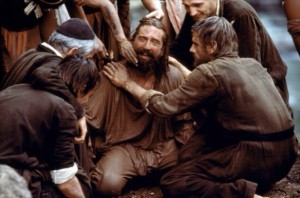Let me preface this post by saying that, unlike many of my articles, the opinions expressed herein are not necessarily grounded in scientific data. Rather, they find their roots in my own experience and that of my clients and peers, as well as religious and spiritual teachings.
Why Redemption Matters
 What exactly is redemption and what does it have to do with counseling and mental health? Dictionary.com lists the following definitions:
What exactly is redemption and what does it have to do with counseling and mental health? Dictionary.com lists the following definitions:
- An act of redeeming or atoning for a fault
or mistake, or the state of being redeemed. - deliverance; rescue.
- Theology. Deliverance from sin; salvation.
- Atonement for guilt.
Deliverance . . . atonement . . . salvation. These are incredibly complex concepts and words highly charged with meaning. What did you notice when reading these? Did you feel good? Did you have a negative reaction? Take a moment to look at your relationship with redemption and it’s counterparts. Have you experienced it? Do you long for it? Or, perhaps it feels foreign or totally unnecessary?
I believe many of us living in the Western world have an important relationship with redemption as it is a concept intimately connected to Christianity, to our own sense of self-worth, and to our relationship with ourselves, others, and the universe/Spirit.
 If we were raised in a Christian household, many of us were taught to believe that we are born in sin and, if left unchecked, might turn into wild beasts; thus we must behave and atone for our sins. Many of us have done things in our lives that hurt others and so carry great amounts of guilt and shame around. Though guilt can be a healthy emotion that helps let us know when we have hurt another, many get stuck in guilt. Unable to forgive ourselves, we search for redemption. Still others simply have a nagging doubt in the goodness of their own nature.
If we were raised in a Christian household, many of us were taught to believe that we are born in sin and, if left unchecked, might turn into wild beasts; thus we must behave and atone for our sins. Many of us have done things in our lives that hurt others and so carry great amounts of guilt and shame around. Though guilt can be a healthy emotion that helps let us know when we have hurt another, many get stuck in guilt. Unable to forgive ourselves, we search for redemption. Still others simply have a nagging doubt in the goodness of their own nature.
We look at our negative thoughts and aggressive reactions and desires and say, “How could I be good if these things exist within me?”
Though we may be consciously aware of it or not, I believe that many of us seek redemption, to know that we are good, and to return to a state of innocence and grace.
We can’t become children again. The road leads onward, not back. However we can rediscover the innocence that was there all along and find redemption by coming to understand there isn’t really any need for it in the first place! Let me explain by talking a little bit about my own experience.
 Some of the most poignant and transformative moments in my life have centered around redemption, and not necessarily for any one act that I committed, though certainly there have been some I’m not proud of. What I am talking about is a sense of redemption that comes from touching one’s essence, or true nature. Experiencing this quality of our own infinite being feels like we’ve been redeemed and freed from our burdens because we realize who we really are, an innocent loving being covered over by differing amounts of ignorance, fear, and pain. This true part of ourselves never committed any “evil” or hurtful act. It only has compassion and love for all and rejoices when we realize that,
Some of the most poignant and transformative moments in my life have centered around redemption, and not necessarily for any one act that I committed, though certainly there have been some I’m not proud of. What I am talking about is a sense of redemption that comes from touching one’s essence, or true nature. Experiencing this quality of our own infinite being feels like we’ve been redeemed and freed from our burdens because we realize who we really are, an innocent loving being covered over by differing amounts of ignorance, fear, and pain. This true part of ourselves never committed any “evil” or hurtful act. It only has compassion and love for all and rejoices when we realize that,
there is no God that judges us and there is no need to atone, we are already that which we seek.
That’s All Fine and Good, But I Still Feel Guilty for the Things I’ve Done Down Here in the Real World
You might wonder why I’m spending so much time talking about redemption, when there is no need for it; if so, you raise an important point. Based on personal experience, the experience of my clients, and the teachings of many wise spiritual teachers, I would say that ultimately there is no need for redemption. However, how we see ourselves here in the relative everyday world has an immense impact in how we feel and the choices we make. If you could suddenly realize your true nature and live there 24/7 then great! You are free from any need for redemption. However, most of us approach this shift slowly, and walking the path of redemption is an important and difficult task. However, the important thing is that we don’t get caught up in some idea of the need to be redeemed or forgiven in the eyes of God, Spirit, or others, and come to understand that we must be redeemed in our own eyes. We must forgive ourselves and realize the innocence behind it all. It is us, and only us, who can redeem ourselves. Others can help, but we must do it.
You Are The Redeemer and The Redeemed
If you want to explore being your own redeemer, I would recommend that you first begin by noticing how your view of yourself affects how you feel, how you see the world, and the choices you make. Unless you are in the tiny percentage of folks who are clinically sociopathic, you have a conscience and you feel bad when you do or say things that are harmful to yourself or others. How you see yourself and feel about yourself is the most important thing! So, take a week or two to simply notice without judgement.
Next, it might be time to make different choices. Pick something that you do regularly that you feel bad/guilty about. It should be a small thing and can be something you do to yourself, like eat food you know have a negative impact, or something you do to others, like being rude or impatient to drivers on the road, or make snide comments at office meetings. Now decide to do something else that feels good and isn’t harmful instead for one week and notice how you feel. Remember,
it’s not about being good, because you already are, and it’s not about proving your worth to some divine being, because you are already worthy; it’s about changing how you see yourself.
One of the fastest ways to changing how you see yourself is to change how you act. However, this is only effective when you at least agree to temporarily buy into the idea that your essence is already good and is wholly unaffected by your behavior.
As you shift how you see yourself you might notice a difference in how you feel and act. You might feel lighter or find yourself naturally being kinder to yourself and others. These are clear signs that, on this relative human level, you are becoming both the redeemer and the redeemed.
Redemption in Psychotherapy
 Sometimes people struggle to make headway on their own with guilt, shame, or unworthiness. In many cases psychotherapy can help a great deal. In the type of counseling I offer we work a lot with Parts–disperate and oftentimes conflicted and disowned aspects of ourselves.
Sometimes people struggle to make headway on their own with guilt, shame, or unworthiness. In many cases psychotherapy can help a great deal. In the type of counseling I offer we work a lot with Parts–disperate and oftentimes conflicted and disowned aspects of ourselves.
Everyone understands the experience of a part of us wanting one thing and another conflicting part wanting another. For example, wanting to perform in front of others, and at the same time not wanting to because it feels terrifying. In therapy we pay special attention to our disowned parts or shadow selves. These are the parts people don’t like and so try to shove away and pretend don’t exist. However, what we resist persists. It is these parts that need to be brought into the light and be redeemed, and to most people’s surprise, they often have great gifts to offer.
Because we often have such a knee jerk reaction to parts that have aggressive tendencies or feel ugly, we push them away before we can really get to know them. In therapy I help people identify these parts and begin to build relationship with them. Each time someone is able to see a disowned part for what it truly is, often a defense mechanism with our best intentions in mind at the time of its creation, redemption is found. When the disowned part, which is part of us, is brought into the light, honored, appreciated, and reconnected we feel a weight has been lifted.
This is redemption, as one more part of ourselves is no longer subject to our own condemnation and so can take its rightful place within the whole.
One of the things that inspires me the most as a psychotherapist is when a client is able to make a shift, however brief, into seeing themselves as they truly are, an innocent, loving, whole being full of compassion. When this happens years of pain and suffering seem to fall away in an instant and a light begins to shine forth from within.
Atonement
 There is a scene in the film The Mission (1986) where a character named Rodrigo, who killed his own brother out of jealousy, is asked by a priest to leave the prison cell where he is dying and come with him to a remote mission in a native village in South America. Rodrigo refuses many times, and when he finally agrees it is on the terms that he must atone, in part, by carrying a huge ball of armor all the way to the village. Though many journeying with him, including other priests, wish to cut him free, Rodrigo refuses to let go. He knows this is his burden to bear and they cannot remove his guilt for him. Though he is dragged back down the muddy slopes of the Amazon rainforest many times and nearly dies climbing a waterfall he carries his burden. There is a fierce determination in his eyes because he knows that for him this weight is a matter of life and death. He will not be able to live with the guilt he has carried since his brother’s death. When he finally reaches the village the native people have no idea what to think, and after a momentary confrontation, quickly cut him free, toss his burden off a cliff, and welcome him with smiles and open hearts. Rodrigo is overcome with relief and sobs wrack his body. He finally allows forgiveness in and is redeemed. It is a deeply powerful scene.
There is a scene in the film The Mission (1986) where a character named Rodrigo, who killed his own brother out of jealousy, is asked by a priest to leave the prison cell where he is dying and come with him to a remote mission in a native village in South America. Rodrigo refuses many times, and when he finally agrees it is on the terms that he must atone, in part, by carrying a huge ball of armor all the way to the village. Though many journeying with him, including other priests, wish to cut him free, Rodrigo refuses to let go. He knows this is his burden to bear and they cannot remove his guilt for him. Though he is dragged back down the muddy slopes of the Amazon rainforest many times and nearly dies climbing a waterfall he carries his burden. There is a fierce determination in his eyes because he knows that for him this weight is a matter of life and death. He will not be able to live with the guilt he has carried since his brother’s death. When he finally reaches the village the native people have no idea what to think, and after a momentary confrontation, quickly cut him free, toss his burden off a cliff, and welcome him with smiles and open hearts. Rodrigo is overcome with relief and sobs wrack his body. He finally allows forgiveness in and is redeemed. It is a deeply powerful scene.
 While not everyone has to go through such a dramatic process of atonement for the harm they may have done, Rodrigo’s journey does exemplify the need many feel for redemption and the lengths people will go to atone and find it. Sometimes atonement is reaching out and doing our best to make amends with others, taking on an austerity, or giving back to others. Though these things can be very helpful, we also have to be careful. Atonement can become an endless process, and can easily turn into self-aggression and self-harm. We must remember that any atoning action we take is designed to shift how we see ourselves and repair the harm we may have caused, and has no impact on our true nature, which is already whole, good, and innocent.
While not everyone has to go through such a dramatic process of atonement for the harm they may have done, Rodrigo’s journey does exemplify the need many feel for redemption and the lengths people will go to atone and find it. Sometimes atonement is reaching out and doing our best to make amends with others, taking on an austerity, or giving back to others. Though these things can be very helpful, we also have to be careful. Atonement can become an endless process, and can easily turn into self-aggression and self-harm. We must remember that any atoning action we take is designed to shift how we see ourselves and repair the harm we may have caused, and has no impact on our true nature, which is already whole, good, and innocent.
Final Thoughts
Ultimately, the fastest route to redemption is simply to experience our wholeness and goodness at the center of our being that is wholly untouchable, never to be wounded or broken by this world. However, sometimes in order to get there we have to take action and shift our behavior so we can begin to shift how we see ourselves.
If any of this speaks to you, I encourage you to experiment, get curious, and see what happens when you take the power of redemption into your own hands. If it is a big challenge for you, I encourage you to seek support with a mental health professional who personally understands this process.
Eventually there is a tipping point with redemption where it becomes easier to experience ourselves in our wholeness, and we act from this place more and more, which then reinforces our identification with this wholeness and goodness.
May your path be filled with grace and may you come to a place where you realize there is no need to forgive or be redeemed because you already are and always have been.

